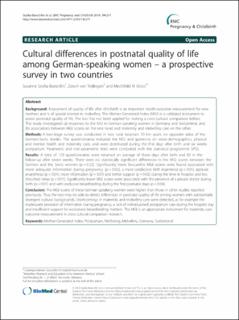Please use this identifier to cite or link to this item:
https://doi.org/10.21256/zhaw-4279| Publication type: | Article in scientific journal |
| Type of review: | Peer review (publication) |
| Title: | Cultural differences in postnatal quality of life among German-speaking women : a prospective survey in two countries |
| Authors: | Grylka, Susanne van Teijlingen, Edwin Gross, Mechthild Maria |
| DOI: | 10.21256/zhaw-4279 10.1186/1471-2393-14-277 |
| Published in: | BMC Pregnancy & Childbirth |
| Volume(Issue): | 14 |
| Issue: | 277 |
| Page(s): | 1 |
| Pages to: | 12 |
| Issue Date: | Aug-2014 |
| Publisher / Ed. Institution: | BioMed Central |
| ISSN: | 1471-2393 |
| Language: | English |
| Subjects: | Epidural anesthesia; Breast feeding; Obstetric delivery; Health care surveys; Outcome assessment (health care); Patient education as topic; Prospective studies; Quality indicators, health care; Postpartum period; Quality of life |
| Subject (DDC): | 618: Gynecology, obstetrics and midwifery |
| Abstract: | Background: Assessment of quality of life after childbirth is an important health-outcome measurement for new mothers and is of special interest in midwifery. The Mother-Generated Index (MGI) is a validated instrument to assess postnatal quality of life. The tool has not been applied for making a cross-cultural comparison before. This study investigated (a) responses to the MGI in German-speaking women in Germany and Switzerland; and (b) associations between MGI scores on the one hand and maternity and midwifery care on the other. Methods: A two-stage survey was conducted in two rural hospitals 10 km apart, on opposite sides of the German-Swiss border. The questionnaires included the MGI and questions on socio-demographics, physical and mental health and maternity care, and were distributed during the first days after birth and six weeks postpartum. Parametric and non-parametric tests were computed with the statistical programme SPSS. Results: A total of 129 questionnaires were returned an average of three days after birth and 83 in the follow-up after seven weeks. There were no statistically significant differences in the MGI scores between the German and the Swiss women (p = 0.22). Significantly more favourable MGI scores were found associated with more adequate information during pregnancy (p = 0.02), a more satisfactory birth experience (p < 0.01), epidural anaesthesia (p < 0.01), more information (p = 0.01) and better support (p = 0.02) during the time in hospital and less disturbed sleep (p < 0.01). Significantly lower MGI scores were associated with the presence of a private doctor during birth (p = 0.01) and with exclusive breastfeeding during the first postnatal days (p = 0.04). Conclusion: The MGI scores of these German-speaking women were higher than those in other studies reported previously. Thus the tool may be able to detect differences in postnatal quality of life among women with substantially divergent cultural backgrounds. Shortcomings in maternity and midwifery care were detected, as for example the inadequate provision of information during pregnancy, a lack of individualised postpartum care during the hospital stay and insufficient support for exclusively breastfeeding mothers. The MGI is an appropriate instrument for maternity care outcome measurement in cross-cultural comparison research. |
| URI: | https://digitalcollection.zhaw.ch/handle/11475/8152 |
| Fulltext version: | Published version |
| License (according to publishing contract): | CC BY 4.0: Attribution 4.0 International |
| Departement: | School of Health Sciences |
| Organisational Unit: | Institute of Midwifery and Reproductive Health (IHG) |
| Appears in collections: | Publikationen Gesundheit |
Files in This Item:
| File | Description | Size | Format | |
|---|---|---|---|---|
| 2014_Gross_Cultural_differences_in_postnatal_quality.pdf | 458.95 kB | Adobe PDF |  View/Open |
Show full item record
Grylka, S., van Teijlingen, E., & Gross, M. M. (2014). Cultural differences in postnatal quality of life among German-speaking women : a prospective survey in two countries. BMC Pregnancy & Childbirth, 14(277), 1–12. https://doi.org/10.21256/zhaw-4279
Grylka, S., van Teijlingen, E. and Gross, M.M. (2014) ‘Cultural differences in postnatal quality of life among German-speaking women : a prospective survey in two countries’, BMC Pregnancy & Childbirth, 14(277), pp. 1–12. Available at: https://doi.org/10.21256/zhaw-4279.
S. Grylka, E. van Teijlingen, and M. M. Gross, “Cultural differences in postnatal quality of life among German-speaking women : a prospective survey in two countries,” BMC Pregnancy & Childbirth, vol. 14, no. 277, pp. 1–12, Aug. 2014, doi: 10.21256/zhaw-4279.
GRYLKA, Susanne, Edwin VAN TEIJLINGEN und Mechthild Maria GROSS, 2014. Cultural differences in postnatal quality of life among German-speaking women : a prospective survey in two countries. BMC Pregnancy & Childbirth. August 2014. Bd. 14, Nr. 277, S. 1–12. DOI 10.21256/zhaw-4279
Grylka, Susanne, Edwin van Teijlingen, and Mechthild Maria Gross. 2014. “Cultural Differences in Postnatal Quality of Life among German-Speaking Women : A Prospective Survey in Two Countries.” BMC Pregnancy & Childbirth 14 (277): 1–12. https://doi.org/10.21256/zhaw-4279.
Grylka, Susanne, et al. “Cultural Differences in Postnatal Quality of Life among German-Speaking Women : A Prospective Survey in Two Countries.” BMC Pregnancy & Childbirth, vol. 14, no. 277, Aug. 2014, pp. 1–12, https://doi.org/10.21256/zhaw-4279.
Items in DSpace are protected by copyright, with all rights reserved, unless otherwise indicated.